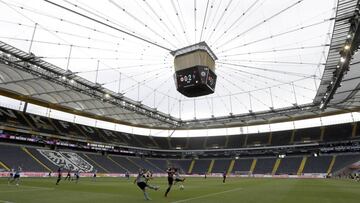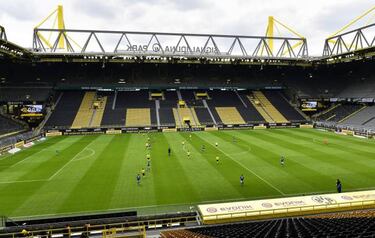The Bundesliga returns: A first look at post-coronavirus football
After much debate about the future of football in the midst of the coronavirus pandemic, we got a first look at what to expect in the months to come


It was clear from the very beginning of BT Sport’s wall-to-wall live Bundesliga coverage that this would not be business as usual. The show began with a few words from presenter James Richardson, sitting a particularly long desk in a sparse studio with Raphael Honigstein at the far side. Owen Hargreaves joined the conversation via video link and Richardson sported a thick beard that one Twitter user described as “very lockdown”.
In-keeping with the studio distancing the usual pre-match interviews were carried out with the help of extra-long microphone poles and once out on the pitch there were no pre-match handshakes or team huddles. Substitutes were seated in the stands rather than the bench and Borussia Dortmund’s were even given BVB-branded facemasks.
Table update 🔄 #BundesligaMD26 pic.twitter.com/SlC1n45rXh
— Bundesliga English (@Bundesliga_EN) May 16, 2020
Closed door experience
Football fans will have been relieved to hear the referee’s whistle for the first time in a major European league since mid-March and the game kicked off as a flurry of shouts rolled around the cavernous Westfalenstadion. It took half an hour for Erling Haaland to break the deadlock and that one moment encapsulated the whole experience of football ‘behind doors’.
It came after a slick passing move down the right side and the young forward’s finish could not have been better placed. After a 61-day hiatus the football was back and had returned a bit of Saturday afternoon normality to the millions watching around the world. But what followed was not what we have come to expect and as the ball nestled in the Schalke net there was a distinct lack of roar from Dortmund’s famous Yellow Wall. Haaland simply jogged toward the corner flag and danced a socially-distanced jig in front of the empty stands.
As Dortmund continued to add to their score the Schalke players looked increasingly bereft and stumbled through the second half without offering any real opposition. Match fitness was clearly an issue for Schalke and we may see a few more uneven contests in the coming weeks.

But fitness doubts aside it seemed that those in blue shirts were as negatively affected by the empty stadium as the home side were. Once Dortmund had their third Schalke seemed to give up all hope and with no baying crowd to provide atmosphere the game soon became fairly lifeless. Today offered a first look at the challenges German clubs will face in these unfamiliar surroundings and it seemed that finding a substitute for the motivation of 80,000 screaming supporters will be a big one.
After the game Dortmund chief executive Hans Joachim Watzke told Sky TV that supporters appeared to have followed the rules and had stayed at home to watch the match, but admitted that it had created a strange atmosphere around the city.
Related stories
“It’s quite surreal,” he said. “I’ve received messages from all over the world in the last couple of hours that everybody is watching and then you go through the city and there’s nothing going on.”
For once the Bundesliga is the biggest draw in world football and on today’s evidence it has the star quality and attacking flair to live up to that billing. The real question will be how to provide a spectacle on the pitch, with no fans in the stands
